For every majestic photograph of Mount Ararat from Yerevan posted to Instagram, there is a far less-appealing view lurking just outside the edges of its neatly cropped frame.
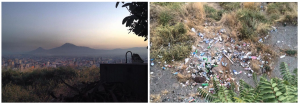
Plastic bags, bottles, dirty diapers, used yogurt containers—all the disposable items that fuel the seemingly insatiable engine of single-use consumerism—are nestled in the nooks and crannies of Armenia’s countryside. The nation has not yet come to terms with the fact that it has fully embraced a throwaway society.
For many years following the collapse of the USSR, derelict garbage bins overflowing with trash were a sign of business as usual in the communal courtyards of Yerevan. Until recently, the infrastructure to manage the enormous, new streams of waste generated by a convenience-driven economy simply did not exist.
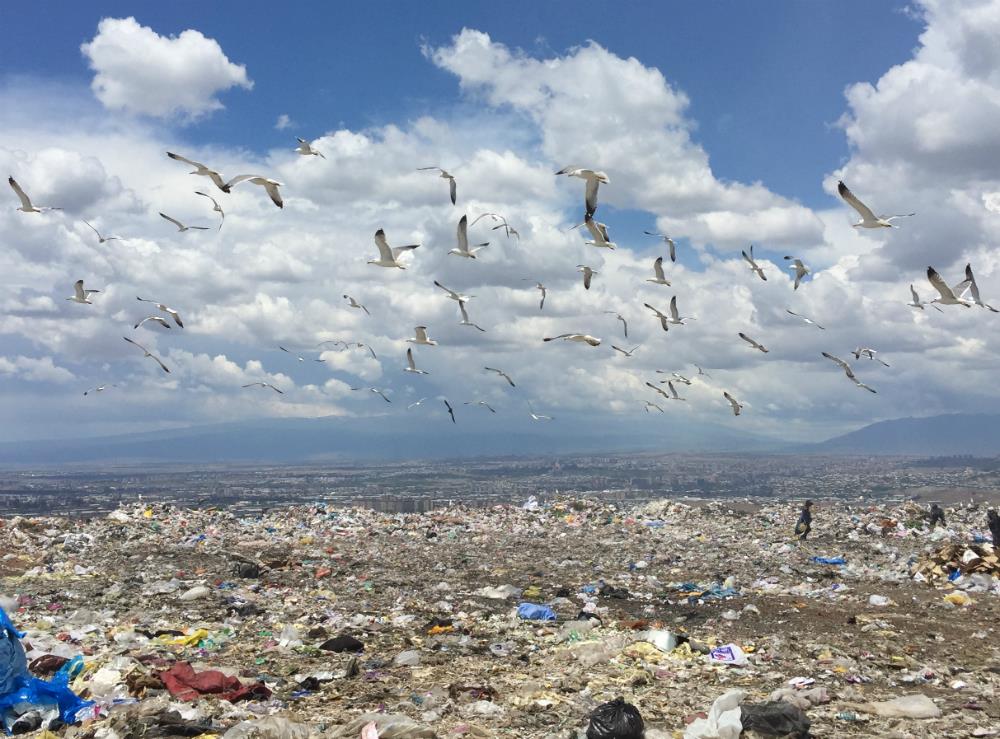
Armenia still is not host to even a single sanitary landfill (plans to allocate 25 million euros in grants and loans toward the construction of one were recently announced). The largest dump, Nubarashen, which receives all of the trash from Armenia’s capital, is infamous for its lack of adherence to any international standards of sanitation.
The tide began to turn in 2013, when Yerevan’s municipality released a tender seeking a contractor to manage disposal of waste for all 12 of the city’s districts. The company that won this tender was Sanitek Ltd., run by Lebanese-Armenian entrepreneur and former defense contractor, Nicholas Tawil. It was the first time in Armenia’s history that a private company had been tasked with collecting the nation’s garbage.
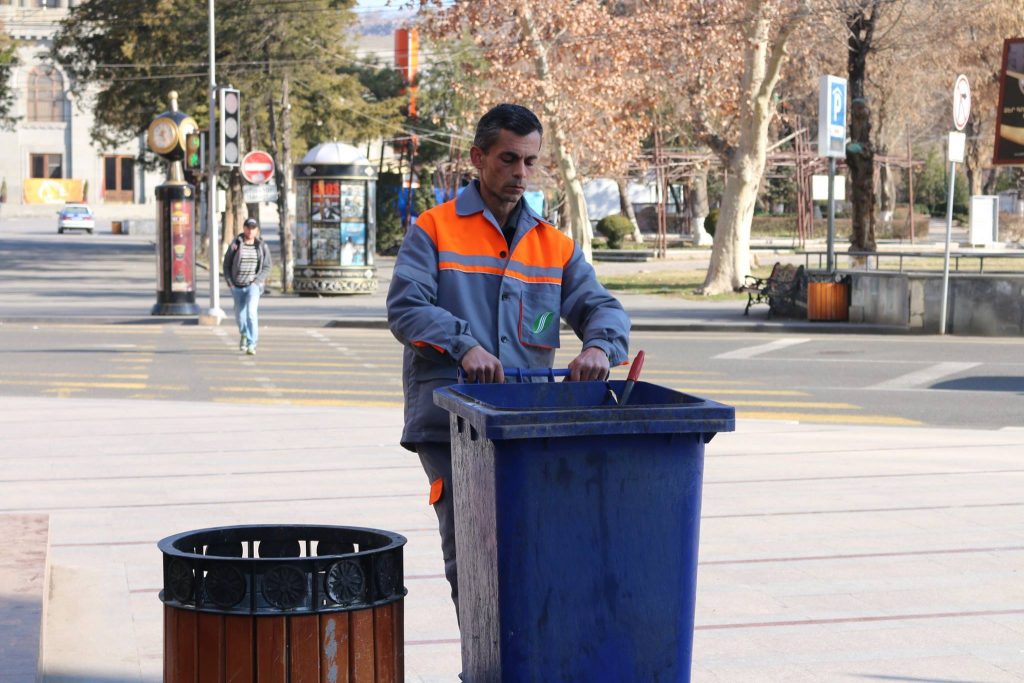
Since then, Sanitek—which employs over 1,000 people in Yerevan and provides street cleaning in addition to trash collection services—has made some positive changes regarding the visibility of garbage. But what does that actually mean for the future of waste management in the city?
I recently spoke with with Tawil and his colleague, Lilit Hakobyan (media officer at the public relations firm Breavis, which does marketing for Sanitek) about the cultural climate for waste management in Armenia, as well as the company’s plans for expansion and the sordid geopolitics of recycling. Because as Armenia and other former Soviet nations show few signs of diminishing reliance on single-use waste streams, these are not topics we can afford to ignore for much longer.
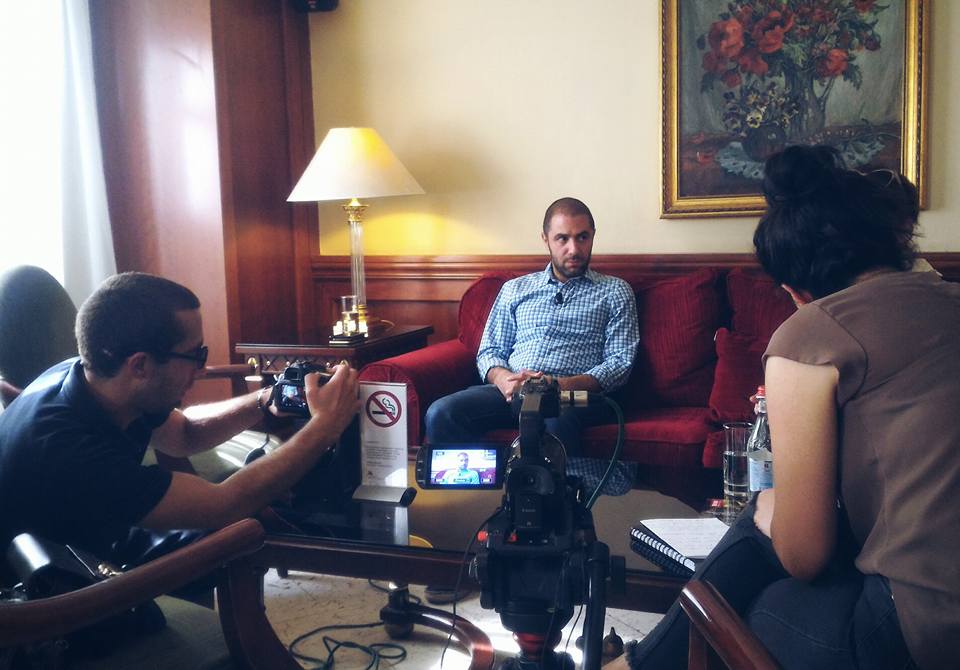
Karine Vann: Nicholas, I’m curious, how did you get into this work? What is your personal background? I tried to do a bit of research before our call, but it was hard to find anything outside of your work with Sanitek.
Nicholas Tawil: [Laughs] I’m a man of mystery. I graduated from university with a degree in international business and another degree in strategic planning. So, I went for around five years in defense contracting, with one of the largest companies being the United States Department of Defense. I worked in Iraq, Afghanistan, Africa, Kuwait, so I was running around a lot. Then, at the end of 2009, I quit. I opened a defense contracting company in Yemen, and it did quite well until the political turbulences happened. Then I opened a defense contracting company in Beirut, which is still now running. And it was by mistake that I opened Sanitek. So, my father was (and still is) a heart surgeon and they wanted something to treat medical waste, and this is how I got into the business. I researched, got the dealership, got the first machine, started working in waste, and now here I am in Armenia.
K.V.: Well, I imagine a lot happened between then and now. Why Armenia? Do you have Armenian roots? And did that have anything to do with your choice?
N.T.: I am half-Armenian. It was an international tender that was released, and since the Armenians and Lebanese have very close ties—and, to be honest, we have similar cultures—we decided to participate in it. We won, and were awarded half of Yerevan. Another company, named Ecogroup, was awarded the second half. Then, the other company had some financial troubles, and a retendering was issued, and we won that and got the rest of Yerevan.
K.V.: What is involved in operating a waste management company in a place like Armenia, with such limited infrastructure? And as Lebanon is a country that has made headlines for its problems managing its huge waste streams, did coming from that environment give you expertise that helped you better navigate this new territory?
N.T.: I have experience in three countries other than Armenia. We have offices in İskenderun (Turkey), Algeria, and Lebanon which operate under the name Hydrowaste. Now, each country is different. Each has its own characteristics, its own culture, its own view of things. I cannot say that Armenia is difficult. It is in a state of development. The culture is changing. As you know, waste management is a culture, it’s not only a business. I can say, in the three years since we started, the culture is changing positively. It needs a lot of time and this is very normal. It is slowly developing, but at a good pace.
K.V.: Is this your full-time job now?
N.T.: I have other businesses, but I prefer to keep them out of this story.
K.V.: I find it noteworthy that you’ve said “trash is a culture”—what is the culture of trash in Armenia?
N.T.: You know, there are three groups of people, as I’ve encountered them. Young generations, who are now in schools and universities—Armenia really has a super educated young generation, and I think they are the ones who will lead the change because they are interested in waste management culture, and they interact with Sanitek in a beautiful way.
K.V.: How do they interact?
N.T.: First of all, they don’t litter, they don’t throw garbage. It is rare to see the young generation throwing garbage. There is another group, which is the elderly, the generation which is a little bit old. They have the perception of a clean Armenia, but sometimes they do litter. But in their heads, they do have this perception of a clean Armenia. This also can be worked upon to educate. And there is, of course, this small group of people which is found in all countries, which litter. So… maybe they enjoy it.
K.V.: Do you find those are young or elderly? Which age group are they from?
N.T.: They are different, but it is a very small percentage. Even in one family, you’ll find 10 members which are amazing and one member who is, we call it, the black sheep of the family.
K.V.: That would be good news, but my experience living in Armenia, which ended in Dec. 2016, did not align with that at all. It was my experience that most people litter.
N.T.: Now it’s changing, by the way, at a very positive pace.
K.V.: When exactly did the tender for Yerevan’s garbage pick up take place? And when did you begin your operations in Armenia?
N.T.: In 2013. But after we got the contract, we started the mobilization on Dec. 1, 2014. It will be three years this December. Also, we are doing a lot of social campaigns, whether advertisements, whether going to universities and giving lectures, whether interviews, trying to integrate this culture in the society.
K.V.: On that note, I’m really impressed with your approach to encouraging a culture of waste management in Armenia, especially given the fact that you don’t have a background in this. Your marketing plays on themes that are very human and personal, that we wouldn’t typically associate with trash—like the video of the philosophical garbage man admiring his beloved city in the morning (above). This is probably what has fascinated me most about Sanitek, in fact. Who’s behind your marketing, and how do you come up with the ideas for your campaigns?
N.T.: We have an excellent media and communications team. To be honest, I’m not a marketing guy. We are partners with Breavis, and they do all our marketing strategies. Of course, we share information and we agree on the overall strategy. But the big applause is for them, not for me.
K.V. [directing questions to Hakobyan]: Can you tell me a little bit more about Breavis?
Lilit Hakobyan: The founder is our CEO, Hovhannes Grigoryan. It’s not only a communications company, but also a public opinion research company. We are providing communications services to different companies, and one of them is Sanitek and thinking about how we can change the culture in waste management, how we can make people feel like it’s their responsibility in this whole process, and as you can see these campaigns have mainly a social direction. It’s not pure marketing, but it’s about the social responsibility for the company, which we think is very important for a these types of company.
K.V.: What did the research look like that you did for the Sanitek campaign?
L.H.: Before each campaign, we did a lot of public opinion research to find out what people think about this, about several aspects of waste management. About their perceptions, their opinions, their expectations of Sanitek. I would like to mention that there are different ways to do public opinion research: survey conducted by phone, or in person, or with focus groups, or by Internet. You can learn more about it from our website, which is still under its old name but will soon change. In Sanitek’s case we have surveyed by phone 800 participants. Then, we present the results to Nicholas, and we create a communications strategy for the year. This is how the process goes. And we can see the results.
K.V. [directing question back to Tawil]: What exact services does Sanitek offer?
N.T.: The framework is segmented into three. We do waste collection, which is collection of waste from bins and bunkers. We do sanitary cleaning, which is the cleaning of streets and yards, both manually and mechanically. And third, we do winter maintenance, which means removing the snow, or clearing the ways of the snow in all 12 districts of Yerevan.
K.V.: Do you have any plans to expand outside Yerevan? To other countries?
N.T.: In these three segments, no, we don’t plan to expand out of Yerevan. The other regions of Armenia do not have the budget for it. But our eyes are on other countries in the Caucasian region.
K.V.: How many other companies are involved in handling Armenia’s waste other than you?
N.T.: The others are municipal companies, which are owned by the municipalities, except…maybe one or two which are very small.
K.V.: Do you know the names of those?
N.T.: I don’t even know their names—they are in villages. But we are the only provider in Yerevan. We are one of the largest investors in Yerevan, we are one of the largest employers in Yerevan—in Armenia, in fact.
K.V.: Before Sanitek entered Armenia, who was handling trash pick up?
N.T.: Municipal companies. Each district had its own.
K.V.: What were some of the challenges you faced when you first came here?
N.T.: To be honest, it was easier than we expected. If I have to talk with all honesty, this is in large thanks to Yerevan municipality, because they have showed support beyond imagination.
K.V.: What happens to the trash once you pick it up? Is there any sorting that happens?
N.T.: No, we send them to open dumps. In the next month or two months, I think Yerevan municipality is issuing a tender for sanitary closing of the old landfill and construction of a new sanitary landfill in Nubarashen that will comply with international standards.
K.V.: Have you had a lot of people interviewing you, because I know that waste management isn’t at the forefront of people’s minds, it doesn’t make headlines in Armenia—at least not for the right reasons. Is this very new for people?
N.T.: Twenty percent they cover good things, 80 percent they cover criticisms.
K.V.: I’ve heard some of the criticisms. At one point last summer, it was reported that there was some issue with trash being picked up. Do you want to comment on that?
N.T.: Whatever happens with the trash, no matter whose fault it is, or what were the details, definitely Sanitek is the one who takes full responsibility and this is part of the ethics of our company. We never run away from our responsibilities. Yes, we had some internal problems in the company, in terms of the machines, which we fixed. And there was an unprecedented amount of tourists that entered the country in July—29.8 percent more than expected. Even now, if you come to Armenia, the traffic is not normal in comparison to other years. So there were a lot of factors that resulted in this problem, but it is now solved.
K.V.: What is the status of recycling in Armenia?
N.T.: We are definitely interested in recycling, but it is a word which is very broad. Recycling has presorting, sorting, composting, recycling of plastic, of colored plastic, HDPE, LDPE, of cardboard, of metal, of colored glass, non-colored glass. So doing the whole process of recycling might cost up to a billion or two billion dollars, literally speaking. So the first stage of recycling, which is the sorting and composting, Sanitek is now starting and discussing with the municipality to do it. And I think we will do it very soon. As to start with recycling factories, at the time being, it is economically not viable. Just to explain to you quickly why, Armenia is a closed country. There are problems with Azerbaijan, there are problems with Turkey, borders are closed, and the market is too small to sell such recyclables because the investment is very high. So the only way to get there is through Georgia, through other places in the world where the transportation costs will be much higher than receiving them from other places in the world. And the second country is Iran. Iran is a very promising market, but due to the political instability and the uncertainty of whether the embargo will come to Iran or not—it’s a big country risk which at this point Sanitek is not willing to take into consideration.
K.V.: Yes, there’s an entire economy behind recycling, it’s something we struggle with immensely in the United States—take, for example, the recent news that we can’t find a market to sell our recycled materials. There is not currently an economic climate where recycling as an industry can thrive. But because it’s sold to consumers as the solution to our trash problem, people who recycle end up consuming even more, creating more trash and more recycled materials on the market that need to be sold without more demand. What is your stance on the economics of recycling? To whom would Sanitek sell its recycled materials? And, finally, do you think there need to be other programs in addition to recycling that educate people about the importance—not just of recycling, but of reducing their amount of waste?
N.T.: The first thing that should be done is a master plan for the country. And now the government is in negotiations with donors because a master plan costs a lot of money. This is the first thing—to see what is good for Armenia. Because what is good for the US in terms of waste management is different from what is good in Europe, and from what is good in Lebanon, and from what is good in Armenia. So, there should be a master plan which answers the question, “What is good for Armenia?” I don’t have the answer, by the way. It’s something that needs not a month or two, it needs years of studies. And it’s all about the economy, so it needs time. But they are on the right path.
K.V.: Are there any talk of zero waste initiatives in Armenia?
N.T.: Zero waste is something that—look, even if you do zero waste through incineration, there would be ashes. So, there would be waste out of incineration. Personally, I don’t believe in something that’s completely zero waste, because at the end of the day there will always be rejected material. No, I personally do not believe in zero waste.
K.V.: When would recycling start, and are there already some recycling services in place in the country?
N.T.: At the end of 2018. Our goal is to start with sorting and composting, and then we’ll see how it goes from there. There is something, but not to be considered: There are scavengers who sell recyclables for some companies, but you cannot take it into consideration.
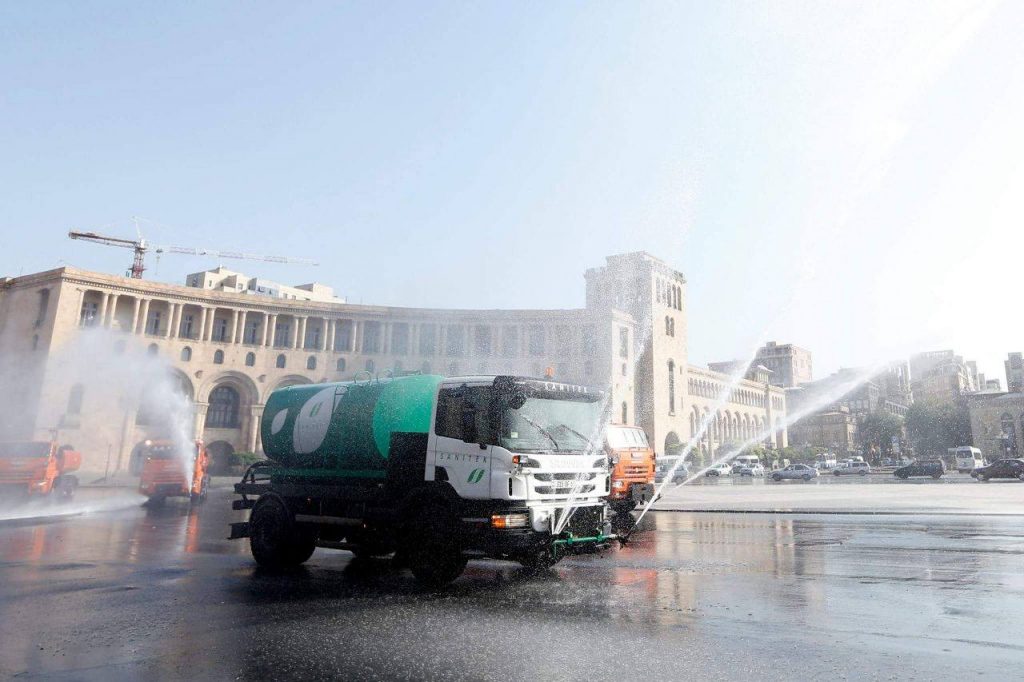
K.V.: What kinds of jobs are you offering?
N.T.: We have everything—from management to cleaners, to drivers, to garbage collectors, to a lot of other stuff.
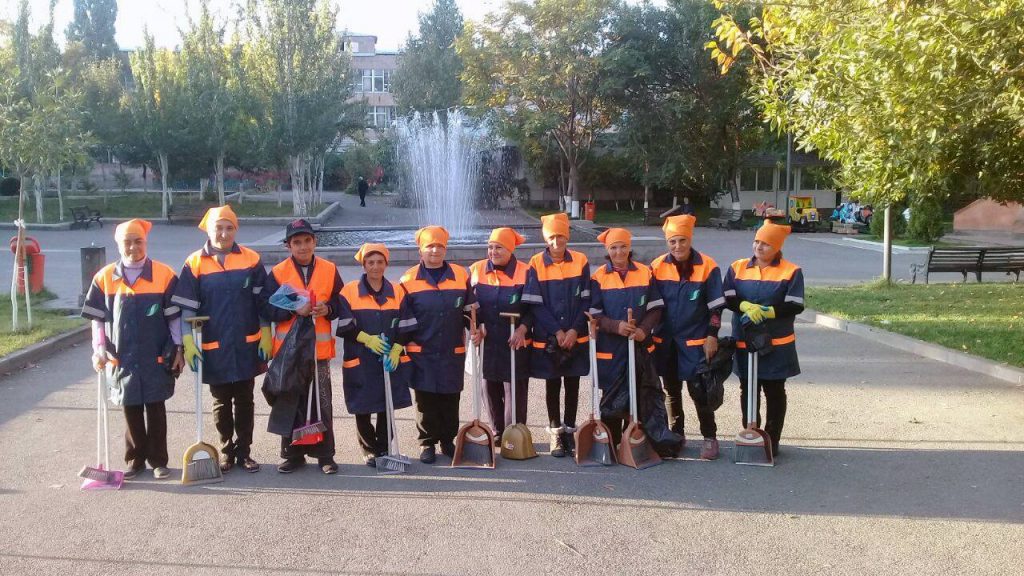
K.V.: Do you also have researchers? Do you work with any waste management experts?
N.T.: We outsource our researchers. We have international consultants that work with Sanitek. One of them is IAT, which is an Austrian company.
Editor’s Note: Following this interview, a supplementary interview was taken with Lilit Hakobyan of Breavis, out of which her answers here were modified for clarity.



Dear Karine:
Interesting piece. I recently–well 4 years ago!–translated a book called Vidures (Aghpasdan in Armenian and TRASH in English) about corruption in post-soviet Armenia which coincidentally takes place among a gang of rag pickers who live in /on.around the Nubarashen garbage dump–I hope that awful place still does not exist??
Best wishes,
Christopher
Dear Christopher,
Nubarashen definitely still exists (as it clearly states in the article). JAMNews wrote a piece about some of these “rag pickers,” who are living in extreme poverty. I think you’ll find it interesting: https://jam-news.net/?p=5676
Karine
It is disheartening to see that the same problems with waste management in Armenia have persisted since 2018. It appears that the dream of finding a viable solution to the garbage disposal problem is still yet to be realized. It is sad.